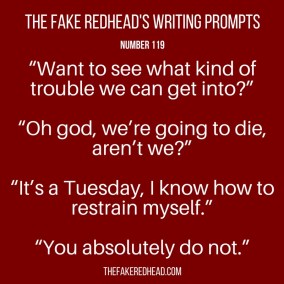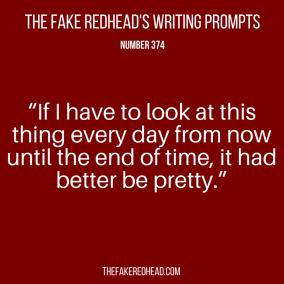Writing Tips | Find Your Next Favorite Book | Prompt Library | Shop The eBooks
World Building
It should go without saying that world building is just as important as naming your protagonist (and everyone else in the novel).
While the thought of world building might actually be more overwhelming than figuring out someone’s name, it doesn’t have to be.
The easiest way to go about it?
Take it slow.
Going into your plot, hell, even before you write your first page, you don’t have to have every inch of your town/city/isolated wasteland/intergalactic cruise ship/alien rainforest already planned out. It’s great if you do, but it doesn’t have to be your first priority.
The way to start is to just write.
When I started the #WhoIsTalyaNightingale novel, I had a handful of specific locations figured out, but as I wrote the story, more and more of the town came to me. In fact, there is one specific location—someone’s house—that I never imagined including before I wrote the scene and introduced it.
But now that it exists, it’s going to have a much larger role in the overall series than I originally thought.
Storyline evolution is awesome.
Click the Continue Reading button for five tips for better world building.
Click To Claim Your 10 FREE Writing Prompts
1 Start With The General, Narrow Down To The Specific
Once you figure out what type of story you’re writing—fantasy, historical, steampunk, modern, etc.—and vaguely what it’s about, then you should try to figure out the general area it takes place in before your narrow it down.
Writing a story located somewhere with a beach is going to have a different feel from one that takes place in the middle of a desert, or in the forest, or in the arctic, and so on.
And speaking of these locations, you should also figure out things like the time of year and the weather, all of which impact your characters.
For example, if your character is a city girl who graduates from college in Arizona and cuts her hair to a cute, short bob, she’s not going to have the same problems with her hair that she will when she moves to Birmingham, Alabama, in August and is faced with moving into her apartment when it’s 90-degrees out with 90-percent humidity. She’s going to struggle a lot with managing her hair until it grows out long enough to pull into a ponytail.
(Why yes, that was me. Feel free to drop a line in the comments if you need any advice on handling hair issues in humidity).
Additionally, figuring out the time of year is crucial too. If your story takes place in New Haven, Connecticut, in the dead of winter, then your character is going to dress in layers and have to trudge through snow in order to get to work every day, whereas your character who is on vacation on Hawaii’s Big Island is going to be in a bathing suit and sandals for most of the novel.
If they’re on the west side of the island, that is. If they’re in Hilo, all weather bets are off.
2 Don’t Forget To Establish The Time Of Day In Your Environment
I’m not saying that you have to establish the time of day in every single scene, but a scene with two cops in the midst of a midnight stakeout is going to have a different look and feel than one with a coed having an early-morning study session at the campus library, or even one with the leaders of a pair of warring factions meeting at dusk with their armies at their backs.
Additionally elements like pollution will impact your setting too. If you’re writing about the sunrise in Beijing, thanks to the heavy blanket of smog throttling the city, the sunrise is going to look very different from the sunrise in an arid desert miles away from the nearest town.
A river full of toxic sludge is going to look and smell different from the untouched waters deep in the rainforest, and an apartment by the ocean in Miami is going to have a different feel from one in Portland.
3 The Passage Of Time Is Important Too
Going into it, you’re probably going to know if your novel spans months at a time, a season, or just a day, and the speed of time is something you need to convey as the story progresses.
If you’re writing something that takes place over a short span like a day or a week, then you’re going to need to break down each and every second, fill in as much story that you can within those limitations. (But if your character or characters are going to travel some distance as part of that sprint, then you can skip from Point A to Point B without stressing over what songs they’re going to add to their Spotify playlist.)
Conversely, if you’re writing something that takes place over months or years, then we don’t need a hundred repetitions of your protagonist’s morning coffee routine. If it’s not relevant to the plot, then you can move right along without worrying that your readers are going to miss something.
4 Man-Made Geography Is Important Too
Buildings, houses, coffee shops, malls, schools, whatever you’re imaging, are all going to look different, depending on where you are.
You’re not going to see those classic brick row-houses that are found in Baltimore in the middle of Los Angeles, nor are you going to see a massive mountain cabin the middle of metro Phoenix.
Once you figure out where and when your story takes place, do some Googling or Pinterest searching to find inspiration for what your houses, shops, schools, or whatever else is important to your setting are going to look like.
The beachy houses and tourist-clogged streets of Santa Barbara are going to have a different look and architectural feel than a manor somewhere in Connecticut or Massachusetts.
5 Populations Are Important Too
Speaking of tourists, if you’re writing a story that takes place in the middle of a metropolis like New York, Los Angeles, Miami, London, Paris, Hong Kong, or Tokyo, then there is a 100-percent chance that your characters are going to bump into someone the second they set foot on the street.
It’s bustling, it’s active, and it’s always loud.
But if you’re writing a story that takes place in a retirement community, then all is going to be dead silent by 9 p.m.
So you need to make sure that your setting is consistent in all ways. That’s not to say that you need to specifically state that Name-Of-Your-Town has a setting of Insert-Number-Here, but make sure to talk about it if it’s relevant. Is it strange that the local park is empty at four in the afternoon? Might be something. Or is it important to note how crowded it is on Saturday when your character goes grocery shopping at Whole Paycheck Foods?
Overall, just take your time, be consistent, and go back and change what needs to be changed when you edit the piece.
That’s why editing is awesome.
Check Out The Last Writing Tip Check Out The Next Writing Tip
Shop The eBooks | Find Your Next Favorite Book
Want more prompts? Check out the Prompt Library.
Do you have a question about writing that you want me to answer? Leave a comment below! (I’m also answering questions in the Facebook group. Hop on over and say hi!)






